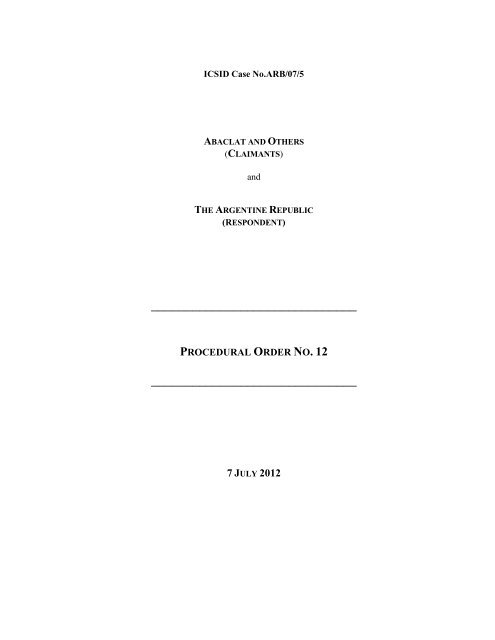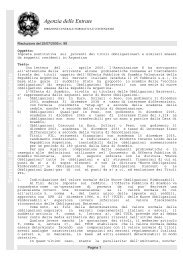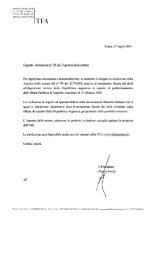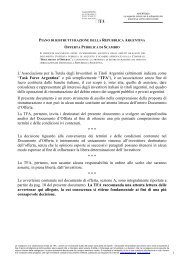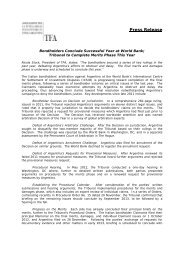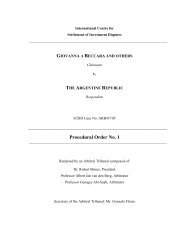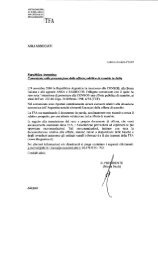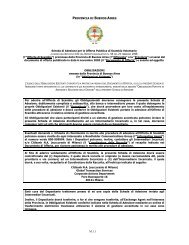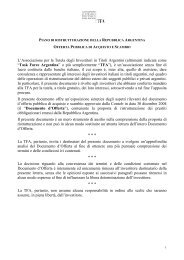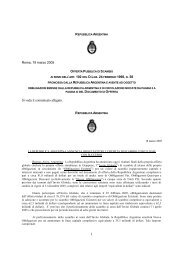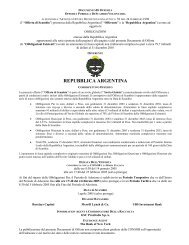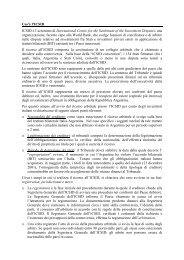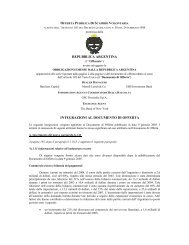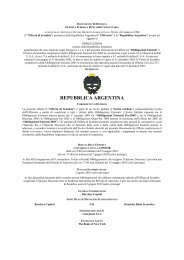PROCEDURAL ORDER NO. 12
PROCEDURAL ORDER NO. 12
PROCEDURAL ORDER NO. 12
You also want an ePaper? Increase the reach of your titles
YUMPU automatically turns print PDFs into web optimized ePapers that Google loves.
ICSID Case No.ARB/07/5<br />
ABACLAT AND OTHERS<br />
(CLAIMANTS)<br />
and<br />
THE ARGENTINE REPUBLIC<br />
(RESPONDENT)<br />
______________________________<br />
<strong>PROCEDURAL</strong> <strong>ORDER</strong> <strong>NO</strong>. <strong>12</strong><br />
______________________________<br />
7 JULY 20<strong>12</strong>
CONSIDERING<br />
(A) The “Hearing on Jurisdiction” which took place in Washington, D.C., from 7 April 2010<br />
to 13 April 2010;<br />
(B)<br />
(C)<br />
The “Decision on Jurisdiction and Admissibility” dated 4 August 2011 (hereinafter the<br />
“Decision”);<br />
The Tribunal’s letter of 4 August 2011, reading in relevant part:<br />
“With respect to the Respondent’s Request for Interim Measures of 21 July 2011 (the<br />
‘Request’), Claimants’ response of 29 July 2011 and Respondent[’s] reply of 3<br />
August 2011, the majority of the Tribunal is of the opinion that Claimants have<br />
convincingly argued that there is a lack of urgency. In the same vein, the majority of<br />
the Tribunal is of the opinion that there is no convincing reason why Respondent’s<br />
Request should be dealt with prior to the issuance of the Decision. Accordingly, the<br />
majority of the Tribunal rejects the Request, Professor Abi-Saab dissenting.<br />
The matters raised in the Request, however, may be discussed for scheduling and<br />
other purposes at the case management conference that will be organized at the<br />
earliest convenience of the Parties and the members of the Tribunal for the purposes<br />
of the further conduct of the proceedings.<br />
[…]”<br />
(D) The Tribunal’s letter to the Parties dated 25 August 2011, advising:<br />
(E)<br />
(F)<br />
“In order to determine how to move forward the parties shall file simultaneous<br />
written submissions within two weeks, i.e. 6 September 2011, on (a) suggestions for<br />
the next phase of the proceedings in light of the Decision (and in particular<br />
paragraphs 671 and 713(4)(i)+(iii)), and (b) the matters raised in Respondent’s<br />
Request of 21 July 2011, in light of the last paragraph in the Tribunal’s letter of 4<br />
August 2011. Within one week thereafter the parties shall file simultaneously reply<br />
submissions.<br />
“Once the above submissions are received, the Tribunal suggests holding a meeting<br />
with the parties in person in Washington, D.C., to discuss and determine (a) and (b)<br />
above. […]” (emphasis as in original);<br />
The time extension granted by the Tribunal for filing of the submissions requested in the<br />
Tribunal’s letter of 25 August 2011 and extending the deadline for the filing until 15<br />
September 2011;<br />
Claimants’ comments filed on 15 September 2011, requesting that the Tribunal (i) adopt<br />
the procedural calendar referenced in the comments and (ii) definitely dismiss<br />
Respondent’s request for provisional measures, which it had requested on 21 July 2011<br />
and which had been rejected by the Tribunal on 4 August 2011;<br />
(G) Respondent’s request for disqualification of two members of the Tribunal (Professors<br />
Tercier and van den Berg) filed on 15 September 2011;<br />
(H) Professor Georges Abi-Saab’s resignation on 1 November 2011;<br />
(I)<br />
The rejection by the Chairman of the Administrative Council of ICSID of Respondent’s<br />
request for disqualification referred to in Recital (G) above on 21 December 2011;
(J)<br />
The appointment of Dr. Santiago Torres Bernárdez by Respondent as notified by ICSID<br />
on 19 January 20<strong>12</strong>, on which date the proceedings resumed as of the date of filing the<br />
Disqualification Request on 15 September 2011;<br />
(K) Respondent’s request to be given a ‘short period’ for presenting its comments regarding<br />
the next phase of the proceedings as requested by the Arbitral Tribunal in its letter of 25<br />
August 2011 (see above Recital (D) above), and the Tribunal’s subsequent decision of 2<br />
February 20<strong>12</strong> granting Respondent the opportunity to file its comments, and also<br />
affording Claimants the opportunity to respond to such comments.<br />
(L)<br />
Respondent’s comments filed on 10 February 20<strong>12</strong>, as permitted by the Tribunal in its<br />
letter of 2 February 20<strong>12</strong>, in which Respondent concluded with a request and a<br />
reservation of rights as follows:<br />
“In conclusion, in light of the contents of the Decision on Jurisdiction, the Argentine<br />
Republic ratifies that it has never given its consent to this type of proceeding, which<br />
further could under no circumstance guarantee its right of defense. Therefore, and<br />
given the circumstances of the present case, the Argentine Republic hereby: i)<br />
requests that the TFA member banks be required to post a bond, in favor of the<br />
Argentine Republic, to secure the pecuniary consequences which Claimants might<br />
incur in this proceeding, such as a potential award of costs against Claimants; and<br />
ii) fully reserves its rights concerning the illegitimate prosecution of this proceeding,<br />
under all the applicable rules and regulations”.<br />
(M) Claimants’ response of 2 March 20<strong>12</strong> to Respondent’s comments referred to in Recital<br />
(K) above, concluding:<br />
For the foregoing reasons, and those set forth in their 15 September 2011<br />
submission, Claimants respectfully request that the Tribunal issue an order as<br />
follows:<br />
The Tribunal hereby adopts the procedural calendar in Claimants’ letters of 15<br />
September 2011 and 2 March 20<strong>12</strong>.<br />
<br />
<br />
<br />
<br />
The Tribunal affirms its rejection of Respondent’s July 2011 request for<br />
provisional measures, with prejudice, and awards Claimants all costs and fees<br />
incurred in responding to the provisional measures request.<br />
Respondent is ordered to provide Claimants access to Respondent’s database<br />
and any other data compiled regarding individual Claimants tendering into the<br />
2010 Exchange Offer.<br />
Respondent is ordered to provide an accounting of its involvement in criminal<br />
proceedings in Italy against individual Claimants, including Respondent’s use<br />
of confidential Claimant documents in connection with such proceedings.<br />
Claimants whose confidential personal information has been used in violation<br />
of the Tribunal’s confidentiality order and EU personal data laws shall be<br />
compensated for any costs, damages, and losses as a result of Respondent’s<br />
illegal acts.<br />
The Tribunal affirms, and again orders Respondent to comply with, the<br />
Tribunal’s orders regarding (i) confidentiality; (ii) impermissibility of<br />
selectively producing non-public documents; and (iii) procedures for the<br />
submission of documents”;<br />
(N) Respondent’s reply of 9 March 2011 to Claimant’s response referred to in Recital (M)<br />
above, concluding:<br />
“Con relación a la audiencia propuesta por el Tribunal, y atento la posición<br />
expuesta por esta parte respecto de la invalidez del procedimiento que visualiza la<br />
2
mayoría del Tribunal, la República Argentina entiende que la realización de dicha<br />
audiencia no se justifica.”;<br />
(O) The procedural meeting held at ICSID’s seat in Washington, DC, on 9 May 20<strong>12</strong>, during<br />
which the Parties elaborated their positions and answered questions by the Tribunal;<br />
(P)<br />
CONSIDERING FURTHER<br />
The requests for interim measures and security for costs have been dealt with in separate<br />
Orders;<br />
(Q) In its Decision, the Tribunal had envisaged to split the merit phase of the proceedings into<br />
two successive phases, and while having set out the basic idea of each phase, the Tribunal<br />
reserved the possibility to further model this next phase and determine the further details<br />
and specificities of such procedure;<br />
(R)<br />
(S)<br />
(T)<br />
Notwithstanding the opportunity repeatedly offered by the Tribunal to Respondent,<br />
Respondent has not submitted any specific proposal as to how the mass claims processing<br />
be addressed in the present case;<br />
The issues which remain open are the following:<br />
(i)<br />
(ii)<br />
Concerning the jurisdiction, it is necessary to verify that all the Claimants have<br />
given their consent, that they fulfill the relevant nationality and domiciliation<br />
requirements, and that they have made relevant investments; that this verification<br />
can be done starting with the existing and available data, and subject to further<br />
examination thereof and, where necessary, additional investigations;<br />
Concerning the merits, it is firstly necessary to determine whether Respondent has<br />
breached the BIT as alleged by Claimants, and if so, how to determine the<br />
damages; in this regard, it is also necessary to determine whether this requires<br />
distinguishing between different groups or types of Claimants and, if so, what<br />
should be the criteria for such distinction; secondly, based on the conclusions<br />
drawn in the first step, it is necessary to decide how to proceed in order to make a<br />
decision on the claims of each individual Claimant and finally to make such<br />
decision.<br />
As already contemplated in its Decision, the Tribunal has the power under Article 44 of<br />
the ICSID Convention and Rule 19 of the ICSID Arbitration Rules to decide on<br />
procedural questions and make those orders required for the proceedings where the<br />
Parties fail to agree on the relevant procedural issues; in the present case the Parties have<br />
adopted opposing positions:<br />
(i)<br />
(ii)<br />
According to Respondent, the Tribunal should firstly deal comprehensively and<br />
finally with the questions relating to jurisdiction, and, in particular, examine<br />
systematically the standing to sue of each and every Claimant;<br />
According to Claimants, the jurisdictional and merits issues should be managed in<br />
parallel so as to allow simultaneous progress on ‘each front’;<br />
3
and the Tribunal, therefore, has the power to decide and issue the necessary orders with<br />
regard to the next steps of the proceedings;<br />
(U) The Tribunal is of the view that<br />
(i)<br />
(ii)<br />
it would not be appropriate to decide in an abstract manner on the merits without<br />
deciding first, or simultaneously, on questions of jurisdiction;<br />
it is, however, not obliged, nor would it be appropriate, to split the jurisdiction and<br />
merits in separate and successive steps; it is widely admitted that a tribunal can<br />
join, or simultaneously, deal with questions of jurisdiction and merits, especially<br />
when – as it is the case in the present proceedings – some of the issues are interconnected.<br />
(V) It is in the interest of all Parties, i.e. of Claimants who are awaiting a decision on their<br />
claims and of Respondent who believes to have behaved appropriately, to obtain a<br />
decision within an acceptable timeframe; it is, therefore, important to design a procedure<br />
that will allow moving forward efficiently, whereby such procedure must comply with<br />
applicable fundamental principles of due process;<br />
(W) One of the main points of using mass claims processing methods and techniques in<br />
ICSID arbitration is whether they would give rise to justifiable due process concerns;<br />
(X) There is no uniform and/or general answer to this question; the answer depends on the<br />
nature and specificities of the mass claims as well as on the type of processing methods<br />
considered and the role to be played therein by the Tribunal, whereby there is<br />
nevertheless a clear trend towards broader acceptance of certain methods compared to<br />
others; 1<br />
(Y) In view of the nature and specificities of the present proceedings, the Tribunal believes<br />
that the next steps as implemented below do not give rise to justifiable due process<br />
concerns to the extent that these steps are designed to be implemented under the constant<br />
supervision, control and approval of the Tribunal and in a way to afford each Party a fair<br />
opportunity to brief all relevant issues and review the underlying evidence;<br />
THE ARBITRAL TRIBUNAL HEREBY DECIDES AS FOLLOWS<br />
1. The proceeding will be divided in two main phases, Phases 2 and 3, and Phase 2 will<br />
further be divided into three sub-phases: Phases 2A and 2B running in parallel, as<br />
determined below, and Phase 2C joining and concluding Phases 2A and 2B.<br />
2. Phase 2A will concern the merits issues and will include:<br />
(i)<br />
Claimants’ Memorial on Phase 2, in which Claimants will set forth their case on<br />
liability and quantum, supported by all documentary evidence, witness statements<br />
1<br />
See Veijo Heiskanen, Arbitrating Mass Investor Claims: Lessons of International Claims<br />
Commissions, In: Permanent Court of Arbitration (Ed.), Chapter <strong>12</strong>, "Multiple Party Actions in<br />
International Arbitration", Oxford University Press, Oxford, 2009, pp. 297-323, which is also the basis for<br />
Recitals (X)-(Y) of this Order.<br />
4
(ii)<br />
and expert evidence, with the exception of Database Verification referred to<br />
below;<br />
Respondent’s Counter-Memorial on Phase 2, in which Respondent will respond to<br />
the Claimants’ Memorial on Phase 2, supported by all documentary evidence,<br />
witness statements and expert evidence, with the exception of Database<br />
Verification referred to below. In its Counter-Memorial on Phase 2, Respondent<br />
may also address issues of jurisdiction and admissibility to the extent that they<br />
have not been addressed and decided in the Decision.<br />
3. Without prejudice to the generality of the issues, in the Memorial on the Merits and the<br />
Counter-Memorial on the Merits, Claimants and Respondent, respectively, will also<br />
address: (a) whether, to the extent relevant, the legitimate expectations of investors are to<br />
be viewed objectively or subjectively; (b) the relevance, if any, of sovereign default and<br />
restructuring of sovereign debt for the resolution of the claims; and (c) whether, and if so<br />
to what extent, investors, claims, and/or issues can be grouped;<br />
4. Phase 2B will concern a verification of Claimants’ database against the requirements set<br />
forth in § 501(iii) of the Decision by one or more experts appointed by the Tribunal after<br />
consultation of the Parties (“Database Verification”). The verification process will be<br />
supervised by the Tribunal. The Parties will be afforded adequate opportunity to<br />
participate in the verification process, and, to this end, may retain their own experts.<br />
Phase 2B is to be completed by a report of the expert(s) which will be issued upon the<br />
filing of Respondent’s Counter-Memorial on Phase 2 (“Database Verification Report”)<br />
and submitted to the Parties.<br />
5. After submission of the Database Verification Report, the Parties will have the<br />
opportunity to request the disclosure of further documents on the basis of the procedure<br />
set out in the schedule under para. <strong>12</strong> below, using a Redfern Schedule, a template of<br />
which will be provided by the Tribunal to the Parties. The Tribunal will then decide on<br />
any open request for disclosure of further documents.<br />
6. Upon completion of the Redfern Schedule, Phase 2A and 2B will be combined into Phase<br />
2C. Claimants and Respondent will submit the Memorial of Reply and Rejoinder on<br />
Phase 2, respectively. In these memorials, Claimants and Respondent will also comment<br />
on the Database Verification Report and the documents obtained through the disclosure<br />
process.<br />
7. If and to the extent that Respondent has addressed issues of jurisdiction in conjunction<br />
with its Counter-Memorial on Phase 2, Claimants may respond to such issues in<br />
conjunction with the Memorial of Reply, to which Respondent may reply in conjunction<br />
with the Memorial of Rejoinder. Thereafter Claimants may file a Rejoinder Memorial on<br />
Jurisdiction. The order of the submissions as decided by the Tribunal shall not affect the<br />
burden of proof, which shall be determined in accordance with the applicable law and<br />
rules.<br />
8. After filing of the Rejoinder Memorial on Jurisdiction, a hearing will take place for<br />
examination of witnesses and oral argument on Phase 2 issues.<br />
5
9. The submission of Post-Hearing Memorials on Phase 2 issues is reserved.<br />
10. The Tribunal will issue a decision or award on Phase 2 issues.<br />
11. In case and to the extent required by the Tribunal’s decision under Phase 2, the Tribunal<br />
will further design and implement a Phase 3, which will concern any issue that is<br />
outstanding in the arbitration and, where applicable, the modalities of application of the<br />
Tribunal’s decision with regard to Phase 2.<br />
<strong>12</strong>. Having regard to the foregoing, the following schedule will apply to Phases 2A and 2B:<br />
2A<br />
2B<br />
1<br />
2<br />
Date Party Description Abbreviation Paragraph<br />
of this<br />
Order<br />
15 Sept <strong>12</strong><br />
Claimants<br />
Claimants’ Memorial on<br />
CL MP2 2(i)<br />
(2 months)<br />
15 Nov <strong>12</strong> (2<br />
months)<br />
3 15 Nov <strong>12</strong><br />
4<br />
5<br />
6<br />
7<br />
30 Nov <strong>12</strong><br />
(2 weeks)<br />
14 Dec <strong>12</strong><br />
(2 weeks)<br />
28 Dec <strong>12</strong><br />
(2 weeks)<br />
11 Jan 13<br />
(2 weeks)<br />
Respondent<br />
External<br />
Expert(s)<br />
Requesting<br />
Party<br />
Producing/<br />
Objecting<br />
Party<br />
Requesting<br />
Party<br />
Objecting<br />
Party<br />
Phase 2<br />
Respondent’s Memorial on<br />
Phase 2<br />
Report on the verification of<br />
Claimants’ database against<br />
the requirements set forth in<br />
§ 501(iii) of the Decision by<br />
one or more experts<br />
appointed by the Tribunal<br />
after consultation of the<br />
Parties<br />
Request for Document<br />
Production in form of<br />
Redfern Schedule<br />
Production of noncontentious<br />
documents and<br />
filing of objections<br />
concerning contentious<br />
document requests<br />
Answer to objections<br />
concerning contentious<br />
document requests<br />
Reply to answer to the<br />
objections concerning<br />
contentious document<br />
requests<br />
RSP MP2<br />
Database<br />
Verification<br />
Report<br />
8<br />
1 Feb 13<br />
Decision on Document<br />
Tribunal<br />
(3 weeks)<br />
Production Requests<br />
5<br />
2C 9<br />
1 Apr 13<br />
Reply on Respondent’s<br />
Claimants<br />
(2 months)<br />
Memorial on Phase 2<br />
CL ReplyMP2 6<br />
10<br />
3 Jun 13<br />
Rejoinder on Claimants’<br />
Respondent<br />
(2 months)<br />
Reply Memorial on Phase 2<br />
RSP RejMP2 6<br />
11<br />
3 July 13<br />
Rejoinder Memorial on<br />
Claimants<br />
(1 month)<br />
Jurisdiction<br />
7<br />
<strong>12</strong><br />
July/Sept/Oct<br />
TBC<br />
ALL Hearing on Phase 2 Hearing P2 8<br />
13 TBD<br />
Claimant &<br />
Respondent<br />
Post-Hearing Briefs 9<br />
14 Tribunal Decision on Phase 2 10<br />
2(ii)<br />
4<br />
5<br />
5<br />
5<br />
5<br />
6
For the Arbitral Tribunal:<br />
Pierre Tercier,<br />
President<br />
7


